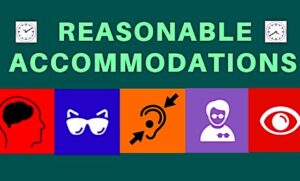 By Gerald L. Maatman, Jr., Alex W. Karasik, and Zev Grumet-Morris
By Gerald L. Maatman, Jr., Alex W. Karasik, and Zev Grumet-Morris
Duane Morris Takeaways: In EEOC v. Charter Communications, LLC, Case No 22-1231, 2023 U.S. App. LEXIS 19528 (7th Cir. July 28, 2023), the Seventh Circuit reversed and remanded a district court’s grant of summary judgment in favor of the employer in an EEOC enforcement lawsuit, holding that an employee was possibly entitled to a modified work schedule as an accommodation to make his commute safer.
This is a significant ruling in the context of EEOC-initiated ADA litigation, as employers may potentially see an increase in litigation related to denials of commute-related accommodation requests.
Case Background
The Charging Party, James Kimmons (“Kimmons’”), alleged that his employer, Charter Communications (“Defendant”) violated the Americans with Disabilities Act (“ADA”) by refusing to accommodate his request for a temporary modified work schedule. Kimmons, who suffers from cataracts, sought a temporary schedule modification allowing him to begin and end his workday two-hours earlier in order to avoid nighttime driving. While originally granting the 30-day request, Defendant ultimately declined to extend this accommodation for an additional 30-days while Kimmons sought closer living arrangements.
Kimmons filed a charge of discrimination with the EEOC. After conciliation efforts failed, the EEOC filed a lawsuit on Kimmons’ behalf. The district court granted summary judgment for Defendant, repeating the oft-cited understanding that employees are responsible for their own commute to and from the workplace. The district court further held that Kimmons’ disability did not affect his ability to perform the essential functions of his job. Id. at *6.
The EEOC thereafter appealed to the Seventh Circuit.
The Seventh Circuit’s Decision
The Seventh Circuit reversed the district court’s grant of Defendant’s motion for summary judgment. In reaching this conclusion, the Seventh Circuit opined that the main question was whether the employee was entitled to a modified work schedule as an accommodation to make his commute safer. The Seventh Circuit concluded that the answer is “maybe.” Id. at *6.
As a threshold question, the Seventh Circuit examined the threshold question of whether an employee’s work-schedule was inherently outside the scope of the ADA. Relying on decisions within its jurisdiction and those of its sister courts, the Seventh Circuit declined to offer a bright line rule. Instead, it concluded that the inquiry was fact-intensive and necessarily unbefitting for summary judgment resolution. Specifically, while acknowledging that “getting to and from work is in most cases the responsibility of an employee, not the employer,” the Seventh Circuit reasoned that an employee’s disability could interfere with that commute, thereby entitling him to a work-schedule accommodation “if commuting to work is a prerequisite to an essential job function, such as attendance in the workplace, and if the accommodation is reasonable. Id. at *3.
Further, the Seventh Circuit determined that a trier of fact could find Kimmons’ travel to his workplace a prerequisite essential to his job duties, which demanded regular attendance. Moreover, whether or not Kimmons’ cataracts constituted a disability was a question of fact, it was not unreasonable to believe it negatively impacted his evening commutes. And because Defendant failed to establish how Kimmons’ schedule modification imposed an undue burden on its operations, the accommodation was not inherently unreasonable sufficient to warrant dismissal of the litigation. While businesses are not compelled to exhaust every avenue to improve trivial comforts of its disabled workforce, the Seventh Circuit emphasized that it will consider the precise accommodation at issue when evaluating these efforts. Id. at *21
Finally, the Seventh Circuit opined that it, “do[es] not intend to endorse an interpretation of the ADA where ‘no good deed goes unpunished.’” Id. at *23. The Seventh Circuit additionally clarified that the employer need not provide the exact accommodation the employee requests. However, the Seventh Circuit held that a qualified individual’s disability substantially interferes with his ability to get to work and attendance at work is an essential function, an employer may sometimes be required to provide a commute-related accommodation, if reasonable under the circumstance. Id. at *26. Accordingly, the Seventh Circuit reversed the district court’s grant of Defendant’s motion for summary judgment and remanded to the district court.
Implications For Employers
This is a novel ruling in that it opens the possibility for employers to be held liable for accommodations related work scheduled based on commuting concerns. While the Seventh Circuit made abundantly clear that it did not want to establish a bright-line rule, this decision demonstrates that in some situations, employers could potentially be responsible for granting accommodation requests related to work schedules and commutes. Employers should thus continue to closely consider all accommodation requests, even those that may seem outside of the scope of day-to-day job duties.
